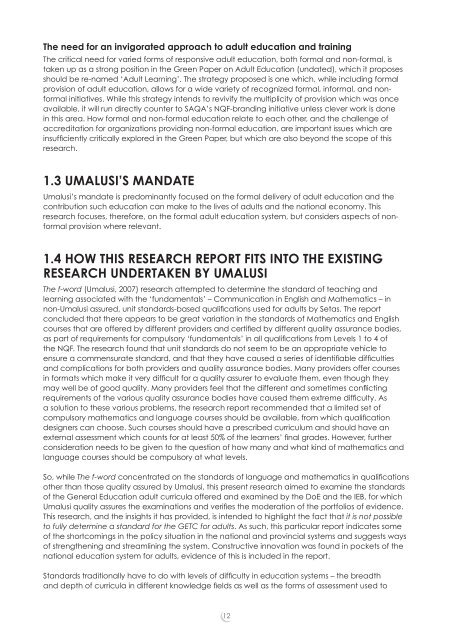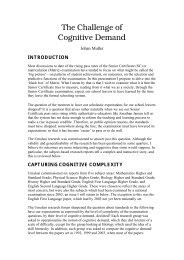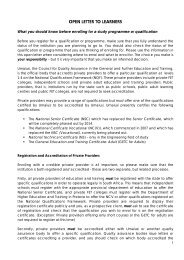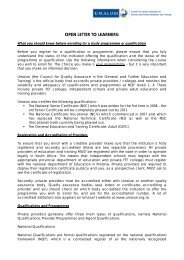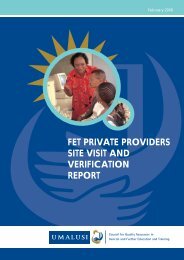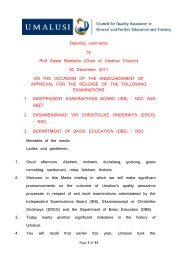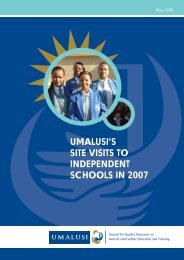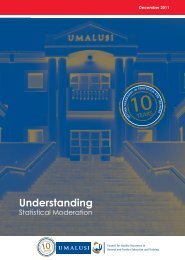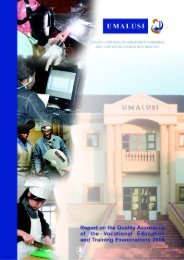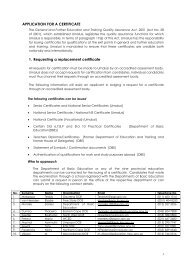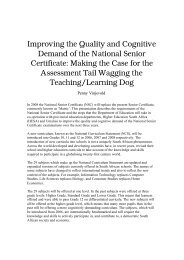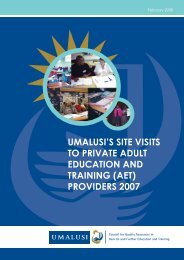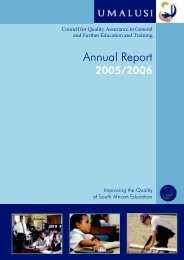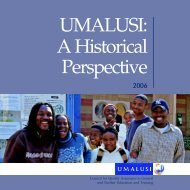Inspecting the Foundations - Umalusi
Inspecting the Foundations - Umalusi
Inspecting the Foundations - Umalusi
Create successful ePaper yourself
Turn your PDF publications into a flip-book with our unique Google optimized e-Paper software.
The need for an invigorated approach to adult education and trainingThe critical need for varied forms of responsive adult education, both formal and non-formal, istaken up as a strong position in <strong>the</strong> Green Paper on Adult Education (undated), which it proposesshould be re-named ‘Adult Learning’. The strategy proposed is one which, while including formalprovision of adult education, allows for a wide variety of recognized formal, informal, and nonformalinitiatives. While this strategy intends to revivify <strong>the</strong> multiplicity of provision which was onceavailable, it will run directly counter to SAQA’s NQF-branding initiative unless clever work is donein this area. How formal and non-formal education relate to each o<strong>the</strong>r, and <strong>the</strong> challenge ofaccreditation for organizations providing non-formal education, are important issues which areinsuffi ciently critically explored in <strong>the</strong> Green Paper, but which are also beyond <strong>the</strong> scope of thisresearch.1.3 UMALUSI’S MANDATE<strong>Umalusi</strong>’s mandate is predominantly focused on <strong>the</strong> formal delivery of adult education and <strong>the</strong>contribution such education can make to <strong>the</strong> lives of adults and <strong>the</strong> national economy. Thisresearch focuses, <strong>the</strong>refore, on <strong>the</strong> formal adult education system, but considers aspects of nonformalprovision where relevant.1.4 HOW THIS RESEARCH REPORT FITS INTO THE EXISTINGRESEARCH UNDERTAKEN BY UMALUSIThe f-word (<strong>Umalusi</strong>, 2007) research attempted to determine <strong>the</strong> standard of teaching andlearning associated with <strong>the</strong> ‘fundamentals’ – Communication in English and Ma<strong>the</strong>matics – innon-<strong>Umalusi</strong> assured, unit standards-based qualifi cations used for adults by Setas. The reportconcluded that <strong>the</strong>re appears to be great variation in <strong>the</strong> standards of Ma<strong>the</strong>matics and Englishcourses that are offered by different providers and certifi ed by different quality assurance bodies,as part of requirements for compulsory ‘fundamentals’ in all qualifi cations from Levels 1 to 4 of<strong>the</strong> NQF. The research found that unit standards do not seem to be an appropriate vehicle toensure a commensurate standard, and that <strong>the</strong>y have caused a series of identifi able diffi cultiesand complications for both providers and quality assurance bodies. Many providers offer coursesin formats which make it very diffi cult for a quality assurer to evaluate <strong>the</strong>m, even though <strong>the</strong>ymay well be of good quality. Many providers feel that <strong>the</strong> different and sometimes confl ictingrequirements of <strong>the</strong> various quality assurance bodies have caused <strong>the</strong>m extreme diffi culty. Asa solution to <strong>the</strong>se various problems, <strong>the</strong> research report recommended that a limited set ofcompulsory ma<strong>the</strong>matics and language courses should be available, from which qualifi cationdesigners can choose. Such courses should have a prescribed curriculum and should have anexternal assessment which counts for at least 50% of <strong>the</strong> learners’ fi nal grades. However, fur<strong>the</strong>rconsideration needs to be given to <strong>the</strong> question of how many and what kind of ma<strong>the</strong>matics andlanguage courses should be compulsory at what levels.So, while The f-word concentrated on <strong>the</strong> standards of language and ma<strong>the</strong>matics in qualifi cationso<strong>the</strong>r than those quality assured by <strong>Umalusi</strong>, this present research aimed to examine <strong>the</strong> standardsof <strong>the</strong> General Education adult curricula offered and examined by <strong>the</strong> DoE and <strong>the</strong> IEB, for which<strong>Umalusi</strong> quality assures <strong>the</strong> examinations and verifi es <strong>the</strong> moderation of <strong>the</strong> portfolios of evidence.This research, and <strong>the</strong> insights it has provided, is intended to highlight <strong>the</strong> fact that it is not possibleto fully determine a standard for <strong>the</strong> GETC for adults. As such, this particular report indicates someof <strong>the</strong> shortcomings in <strong>the</strong> policy situation in <strong>the</strong> national and provincial systems and suggests waysof streng<strong>the</strong>ning and streamlining <strong>the</strong> system. Constructive innovation was found in pockets of <strong>the</strong>national education system for adults, evidence of this is included in <strong>the</strong> report.Standards traditionally have to do with levels of diffi culty in education systems – <strong>the</strong> breadthand depth of curricula in different knowledge fi elds as well as <strong>the</strong> forms of assessment used to12


